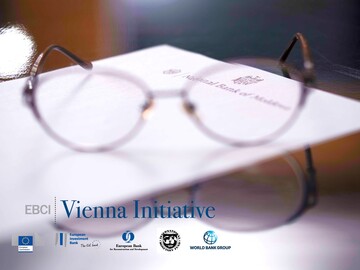
The National Bank of Moldova has joined the Vienna Initiative to enhance the sustainability and transparency of the country's financial system
As noted in the NBM's press release, in particular, it has become a member of the Vienna Initiative, a platform for public-private sector cooperation to protect financial stability in emerging economies in Europe. As emphasized by the National Bank, joining this platform is due to its efforts to enhance the sustainability and transparency of the financial system of Moldova, the strategic goal of integration into the European Union, as well as the commitment to promote regional financial stability. As noted, over the past decade, significant reforms have been carried out in the banking sector of Moldova, which have contributed to increased transparency and improved prudential supervision. At the same time, given the shareholder structure of Moldovan banks, consisting mainly of European investors, and the presence of subsidiaries of European banking groups on the Moldovan market, the development of policies and regulatory decisions in the EU also has a direct impact on the financial stability of Moldova. Thus, by strengthening the link between the financial system of Moldova and the EU system, the accession of the National Bank of Moldova to the Vienna Initiative will provide our country with an expanded platform for dialogue and coordination between key public and private sector actors influencing European financial markets. The Vienna Initiative was created in January 2009 in response to the global financial crisis that started in 2008, to help emerging economies in Europe cope with the shocks it caused by addressing the issue of capital outflows from subsidiaries of large cross-border banks in Central and South-Eastern Europe. In January 2012, Vienna Initiative 2 was launched in response to the new risks posed by the eurozone crisis for the region of Central and South-Eastern Europe. The main objectives of the Vienna Initiative are: to prevent an orderly decline in banks’ lending relative to their capital; to ensure that any cross-border financial stability issues are addressed; the adoption of policy measures, especially in the area of banking supervision, that take into account both the interests of the home countries of banking groups and the interests of the countries in which these groups have subsidiaries or branches. The Vienna Initiative brings together participants from the public and private sectors: the institutions of the European Union - the European Commission and the European Central Bank; the international financial institutions - the IMF, the World Bank, the European Bank for Reconstruction and Development, the European Investment Bank; the central banks and regulators of the EU countries that are home countries of financial institutions present in the developing European economies; the central banks and regulators of the European countries that are home countries of branches and subsidiaries of the above-mentioned financial institutions. These countries have the status of candidate countries or potential candidate countries for EU accession; Western banking groups with a commercial presence.// 09.07.2025 – InfoMarket







